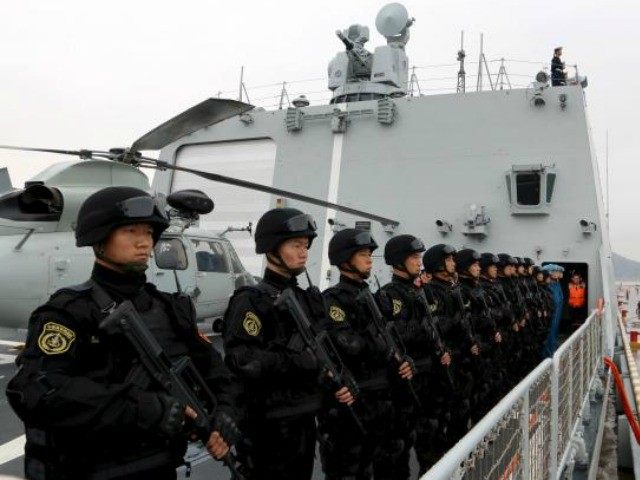The Chinese government has begun to vocally express its desire for an end to violence in Yemen, after an evacuation out of war-torn Aden that many contend has elevated China’s role as a player in the Middle East. While officially condemning neither the Houthi rebels’ coup attempt nor the Saudi-led Arab coalition’s intervention, China’s long-standing ties with Iran indicate China’s weight will fall on the side of the Shiites.
The Chinese Foreign Ministry issued a statement on Tuesday generally condemning the outbreak of violence in Yemen. “China is deeply concerned about the situation in Yemen. We hope all parties will declare a ceasefire soon to avoid more civilian casualties,” said Foreign Ministry representative Hua Chunying. She reiterated China’s desire to see “all parties… abide by international law and provide safety guarantees and support for countries to evacuate their nationals.”
Evacuation of Chinese citizens– and the opportunity to curry international favor by allowing stranded foreigners to hop aboard Chinese ships– appears to be the paramount concern for China at the moment. While state outlet Xinhua has published reports on the violence in Yemen, its features have touted the Chinese navy’s ability to evacuate its citizens. Quoting Hua once more, Xinhua reports that China has claimed its evacuation efforts “embody the government’s people-first principle and the spirit of internationalism and humanitarianism.” China boasts rescuing citizens of Pakistan, Ethiopia, Singapore, Italy, Germany, Poland, Ireland, Britain, Canada and Yemen. Even a Japanese tourist was allowed to board a Chinese ship to Djibouti, eliciting a rare expression of gratitude from the Japanese government to China.
The New York Times describes China’s reporting on its own evacuation efforts as “exuberant backslapping,” noting that the Chinese government had never engaged in such a large-scale evacuation effort. The move proved to be especially wise as President Obama’s State Department announced that they would do nothing to evacuate American citizens from Yemen, instead telling those with U.S. passports to request Indian government assistance.
Iran, repeatedly accused of exacerbating violence in Yemen by providing weapons and support to the Houthi rebels, has nonetheless declared China’s generalized call for an end to the violence a victory for themselves. “Russia and China have expressed deep concerns over the alarming situation in Yemen as Saudi Arabia pushes ahead with its military campaign against the impoverished Arab country,” Iran’s state-run Press TV reports, not mentioning Iran’s role in the violence. Yet, the quote in the article itself from spokesperson Hua gives no indication that China is condemning Saudi Arabia alone. In a separate article, Press TV again signals that China, alongside Russia, has begun to “press for an end to the military aggression” through targeting Saudi Arabia alone.
There is reason to believe China will back Iran in the current Yemen military struggle. China supports Iran’s efforts to acquire nuclear technology, in part because sanctions related to the nuclear program have forced Iran to delay payments to China for years. To that end, China is hosting Iran’s oil minister this week to discuss increasing trade. President Xi Jinping also postponed visits to Saudi Arabia and Egypt this week, citing Saudi Arabia’s “current preoccupations” as the reason for the delay.
Yet within Yemen itself, China’s relationship with the government of Abed Rabbo Mansour Hadi was strong enough to justify some frustration with the Houthi coup attempt. China has been trading in oil with Yemen since 2005, and had a stake in 8% of Yemen’s total production under Hadi. China offered Yemen’s defense ministry an $8 million grant last year. What’s more, China has explicitly provided Yemen with aid money to help those fleeing from Houthi violence as early as 2009.
With an $8 stake in Yemen’s oil production, which is widely considered to small to compete globally with giants like Saudi Arabia and the United States, Yemen needs China’s business. This will not change with any transfer of power, violent or not, so it remains in China’s best interests to call for “stability” generally while self-aggrandizing about its humanitarian efforts. This allows both sides to claim China supports their war, while the Chinese government can ward off a well–earned reputation for doing little to remedy international crises.

COMMENTS
Please let us know if you're having issues with commenting.